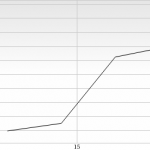This week we learned that Mother Nature isn’t quite yet done with slapping the U.S. around. As California suffers through the most deadly wildfires in history, our hearts go out to all those affected. This has been a year to try the internal strength of many, but over on Wall Street, life is more like the ending of a Disney animation.
The second week of October sung essentially the same tune we’ve been boogieing to for much of the year:
As of Friday’s close, 76% of the trading days when the CBOE S&P 500 Volatility Index (VIX) closed below 10 occurred just in 2017. Both the S&P 500 and the Dow Jones Industrial Average indices are on track for record or near record lows for average daily moves in 2017 – the hyper calm is becoming unnerving. The S&P 500 has now gone 235 trading days without a correction of more than 3%. The record is 241 days back in 1996 when the Federal Reserve was easing rates and the economy was a mere 4 years into the cycle versus today’s 8+ years and the Fed not only raising rates but embarking on Quantitative Tapering.
Most major indices ended the week relatively flat, while the SPDR Gold Shares ETF (GLD) has gained over 2% and the iShares 20+ Year Treasury Bond ETF (TLT) has gained just a little less than that. We are seeing the return of the mega-cap leads with the S&P 500 equal weight index underperforming the S&P 500 market cap weighted index as the FAANG trade of Facebook (FB), Amazon (AMZN), Apple (AAPL), Netflix (NFLX), and Alphabet (GOOGL) all outperforming the S&P 500 and the NASDAQ this week.
According to a weekly survey by the National Association of Active Investment Managers, the managers ranked as the most bearish are more than 90% long the market, versus typically having around a 93% net short position according to data going back to 2006. Today equity long/short hedge funds have built up their highest net-long exposure to the Russell 1000 since 2008.













Leave A Comment